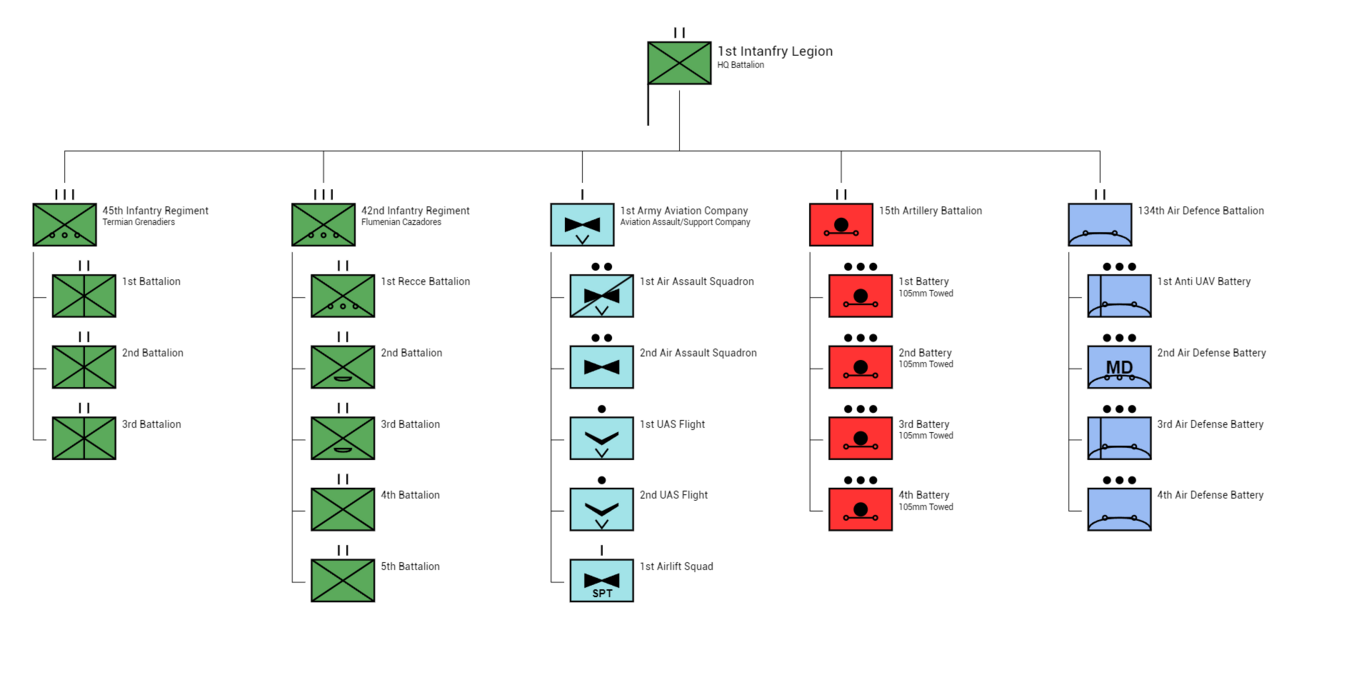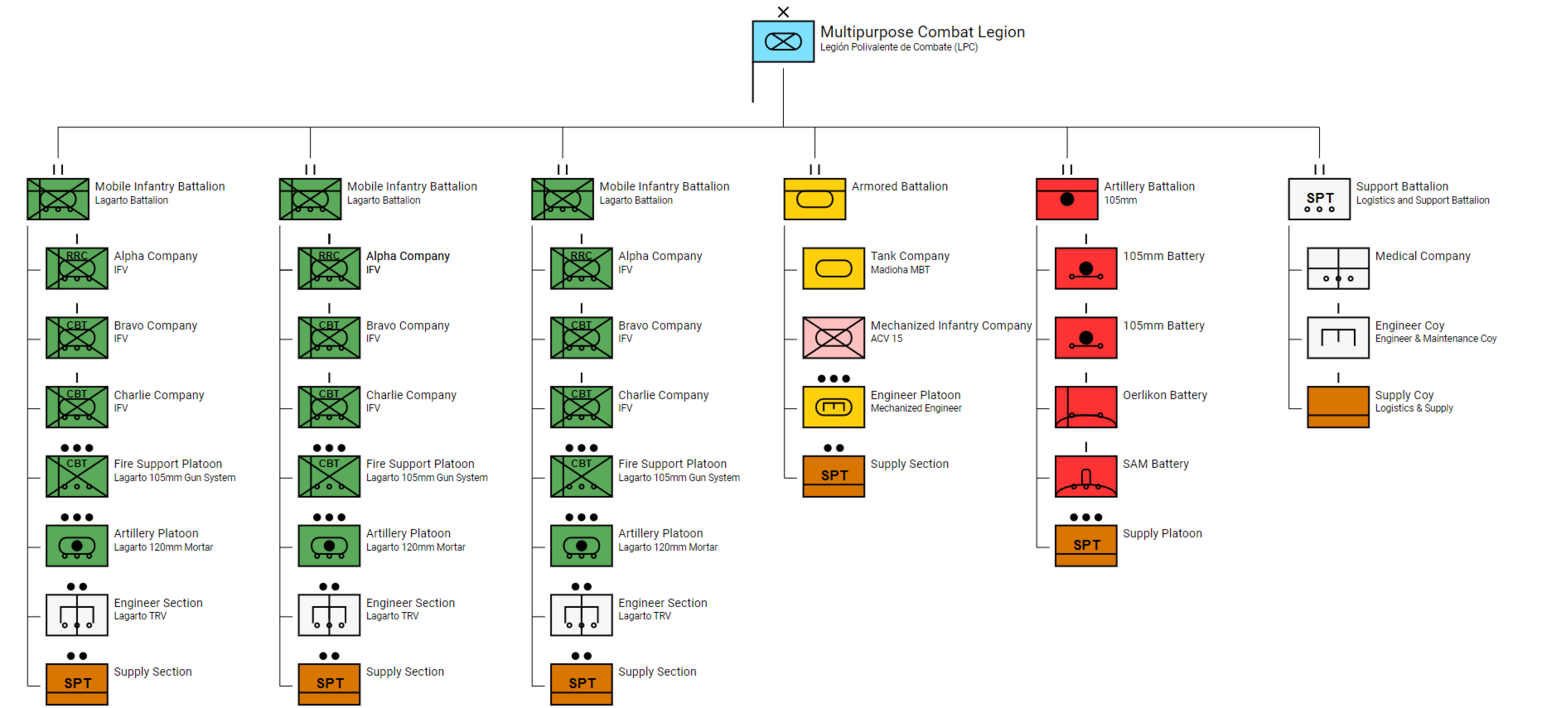Structure of the Pelaxian Army: Difference between revisions
Created page with "The current structure of the Pelaxian Army was reformed and modernized through the ambitious 2010 Weapon Modernization Project, a program aimed at transforming and updating the country’s military capabilities and organization. The main goal of this initiative was to adapt the Pelaxian Armed Forces to contemporary needs, optimizing both their operational capacity and flexibility in response to the changing geopolitical and defense dynamics of the 21st century. The 2010..." Tag: 2017 source edit |
mNo edit summary |
||
| Line 1: | Line 1: | ||
The current structure of the Pelaxian Army was reformed and modernized through the ambitious 2010 Weapon Modernization Project, a program aimed at transforming and updating the country’s military capabilities and organization. The main goal of this initiative was to adapt the Pelaxian Armed Forces to contemporary needs, optimizing both their operational capacity and flexibility in response to the changing geopolitical and defense dynamics of the 21st century. | The current structure of the Pelaxian Army was reformed and modernized through the ambitious 2010 Weapon Modernization Project, a program aimed at transforming and updating the country’s military capabilities and organization. The main goal of this initiative was to adapt the Pelaxian Armed Forces to contemporary needs, optimizing both their operational capacity and flexibility in response to the changing geopolitical and defense dynamics of the 21st century. | ||
The 2010 Weapon Modernization Project redesigned the Army with a focus on multi-purpose units. These units are capable of operating in a wide range of scenarios, from conventional conflicts to peacekeeping operations, humanitarian aid, or emergency response. This versatile design allows the Pelaxian Army to respond more effectively, both in times of war and in crisis situations at home or abroad. | The 2010 Weapon Modernization Project redesigned the Army with a focus on multi-purpose units. These units are capable of operating in a wide range of scenarios, from conventional conflicts to peacekeeping operations, humanitarian aid, or emergency response. This versatile design allows the Pelaxian Army to respond more effectively, both in times of war and in crisis situations at home or abroad.The Brigade as the Basic Unit: The Legion. | ||
The Brigade as the Basic Unit: The Legion. | |||
| Line 12: | Line 11: | ||
=== Infantry Legion === | === Infantry Legion === | ||
[[File:Infantry.png|thumb|Order of battle for the 1st Infantry Legion from North Corps]] | [[File:Infantry.png|thumb|Order of battle for the 1st Infantry Legion from North Corps|center|1359x1359px]] | ||
=== Mechanized Legion === | === Mechanized Legion === | ||
| Line 19: | Line 18: | ||
==== Armored Battalion ==== | ==== Armored Battalion ==== | ||
== Multipurpose Combat Legion == | == Multipurpose Combat Legion == | ||
[[File:MCLegion.png|thumb|Standard order of battle for a MCL of the Pelaxian Army]] | [[File:MCLegion.png|thumb|Standard order of battle for a MCL of the Pelaxian Army|center|1566x1566px]] | ||
Revision as of 08:31, 29 September 2024
The current structure of the Pelaxian Army was reformed and modernized through the ambitious 2010 Weapon Modernization Project, a program aimed at transforming and updating the country’s military capabilities and organization. The main goal of this initiative was to adapt the Pelaxian Armed Forces to contemporary needs, optimizing both their operational capacity and flexibility in response to the changing geopolitical and defense dynamics of the 21st century.
The 2010 Weapon Modernization Project redesigned the Army with a focus on multi-purpose units. These units are capable of operating in a wide range of scenarios, from conventional conflicts to peacekeeping operations, humanitarian aid, or emergency response. This versatile design allows the Pelaxian Army to respond more effectively, both in times of war and in crisis situations at home or abroad.The Brigade as the Basic Unit: The Legion.
Corps
Division Structure
Legion Structure
The Pelaxian Army is now organized around the brigade unit, also known as the "Legion". This reorganization positions the Legion as the cornerstone of the military structure due to its ability to quickly deploy, adapt to various environments, and carry out independent operations effectively. Each Legion is designed to be a highly autonomous force, capable of conducting specific missions without relying on higher command structures in the short term. Each Legion integrates capabilities that include infantry, artillery, armored cavalry, logistics, and communications, allowing them to operate independently when necessary. This "combined arms" configuration enables Legions to respond swiftly and with significant tactical strength to any situation, whether it be defending national territory or engaging in international operations.
Infantry Legion

Mechanized Legion
Mechanized Battalion
Armored Legion
Armored Battalion
Multipurpose Combat Legion
